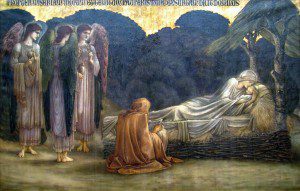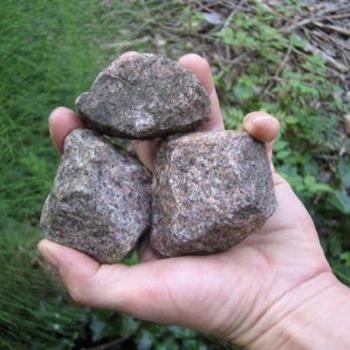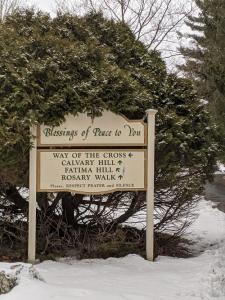 “They appear more often now, both of them, and on every visit they seem more impatient with me and with the world,” begins Colm Toibin’s novella, The Testament of Mary. “There is something hungry and rough in them, a brutality boiling in their blood, which I have seen before and can smell as an animal that is being hunted can smell.”
“They appear more often now, both of them, and on every visit they seem more impatient with me and with the world,” begins Colm Toibin’s novella, The Testament of Mary. “There is something hungry and rough in them, a brutality boiling in their blood, which I have seen before and can smell as an animal that is being hunted can smell.”
A friend gave me a copy of Toibin’s book a few years ago, and I read it through my fingers, afraid it would disabuse me of my tenuous Marian devotion. Mary is one of my Catholic hang-ups. I love the rosary as a soothing mantra in times of distress, and I have a Mary statue in my yard because it reminds me of home. But I feel no genuine closeness to the virgin, and pious chatter about the Blessed Mother makes my blood run cold. Maybe it was all those years in the Mary-fearing fundamentalist Christian churches of my dad. Maybe it was those terrifying glow-in-the-dark Marys all Catholic children in southeastern Louisiana had in our bedrooms that led me to conflate her with the Bloody Mary game we played in the mirror at slumber parties. But I’d rather politely ignore the Church’s teachings on Mary. It’s one of those prickly issues that might confirm I’m actually a protestant.
Despite what might have been his attempt to undo the traditional Christian narrative about Christ’s mother, I found Toibin’s imagining of Mary irresistible. In the quote above, she’s describing the apostles, who hound her as she hides from a vengeful world. They want her to confirm their Easter stories. But she could also be speaking of the angels—angels are always terrifying in my imagination, towering figures with ragged, animal wings, not obese babies. Angels brought Mary the news of her destiny carrying nails and a crown of thorns. It is this image of Mary the hunted that Toibin pursues from the Annunciation to her death.

I’ve never been a fan of Mary the mute, pious doll on the pedestal in my childhood churches. It’s neither sinful nor shocking to imagine that the one who was so highly favored might have counted the cost of such honor, or wondered at her own fiat. She was a human mother, and though we know little of her, we know she was a thinker.
The Bible tells us almost nothing about Mary, but among the few details it gives us flat out is that she pondered things in her heart, that she wondered about what was happening to her and her son. It’s controversial to say so in the Catholic Church, but I can’t understand why. Mary’s incomplete understanding of her own life story and the meaning of the cross–the engine that drives Toibin’s Testament–is right there in the Gospels.
Toibin’s Mary runs from the foot of the cross. Afterwards, she is so lost in her own despair, her sense of having lost everything and failed her child, that she dismisses the memories of her conception and pregnancy as merely strange and special, something every human mother, lost in the mysteries of her own body, feels. “It does not seem ordinary,” she says. Every pregnant woman has felt that favor, that power and wonder and blessedness.
This is not the Queen of Heaven, but the poor in spirit, her suffering so great she is bereft even of the memory of faith. I recognized her at once.
Caryll Houselander, in her Marian book The Reed of God, also imagined the mother of Christ as a human mother, not the Madonna of the Christmas card. Her Mary is both beautifully human and thoroughly Christian. Her greatest achievement is bringing Christ into the world, which Houselander manages to render—inspirationally—as perfectly ordinary. In this way, she argues, Mary is the only model of sainthood most of us can ever hope to emulate.
Every day, each of us has the same chance to bring Christ to the world through our simplest actions, through saying yes, through our care for our family, through our love for others.
But Houselander’s Mary, however relatable, is not really like us. Or at least, not like me. Her trust in God never wavers.
Toibin imagines Mary without Christianity, a mother who never understands why her son had to suffer. After she watches his torture, she doesn’t care to save her own soul, much less humanity’s. She’d throw away all eternal life for one more golden Sabbath day with her family, for a shy smile from her young son.
This Mary’s love for God and man is dangerously roped to her love of her own family. She is far from the apex of Christianity, or any kind of model for sainthood. She is me.
“It is simple,” she says. “If water can be changed into wine and the dead can be brought back, then I want time pushed back. I want to live again before my son’s death happened, or before he left home…I want to be able to imagine that what happened to him will not come, it will see us and decide—not now, not them. And we will be left in peace to grow old.”
These are the words of an afflicted soul. And yet they are still a prayer. They cry out for redemption. Give me back my life, Lord. How often have I whispered those words to the dark?
Toibin’s Testament is perversely beautiful, so aware of the nasty truths of the human mother’s heart. Yes, he makes the apostles look like a bunch of thugs. Yes, his miracle-working Jesus is vain and power-drunk (This Mary is embarrassed by her son’s behavior with his friends—what mother isn’t?). Yes, his Mary is bitter and hungry for someone else’s catastrophe to eclipse her own suffering, comforted only by the fertility idol she keeps hidden in a trunk.
And you know what? I could imagine, faced with the horrible death of those I love, feeling and doing all of these things. Even without such a tragedy, there are dark days and nights when I am, like Toibin’s Mary, without Christianity.
But what if Houselander is right, and Mary’s greatest gift was not her own spiritual perfection, but the bearing of Christ into the world?
In the end, Mary is hunted not by the apostles but by her own guilt. She dreams of holding her son’s broken body, as the apostles say she did. She longs for death. And yet there is hope. We leave her walking toward her own dream of heaven, a time when all this might not have happened, a place where redemption means that her family was spared.












